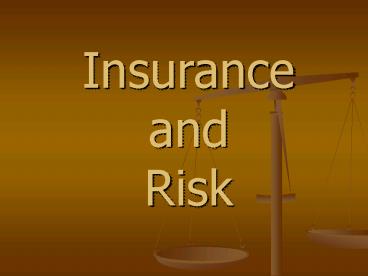Insurance and Risk - PowerPoint PPT Presentation
1 / 70
Title:
Insurance and Risk
Description:
2- Payment of fortuitous losses. Insurance plans provide for ... A fortuitous loss is one that is unforeseen and unexpected and occurs as a result of chance. ... – PowerPoint PPT presentation
Number of Views:30
Avg rating:3.0/5.0
Title: Insurance and Risk
1
Insurance and Risk
2
Meaning of Insurance
Requirements of an Insurable Risk
Description of Insurable and Uninsurable Risks
Insurance Distinguished from Other Transactions
Types of Insurance
Social Benefits and Costs of Insurance
3
Meaning of Insurance
4
Insurance is a technique for handling an already
existing pure risk.
5
Basic Characteristics of Insurance
6
1- Pooling of losses
7
Losses incurred by the few are spread over the
entire group, so that in the process, average
loss is substituted for actual loss.
8
- Pooling is essential for two reasons
- losses of the few are spread over the entire
group, so that average loss is substituted for
actual loss. Thus, the financial burden of the
loss is shared by the entire group. - pooling involves the grouping of a large number
of exposure units so that the law of large
numbers can operate to provide a substantially
accurate prediction of future losses.
9
2- Payment of fortuitous losses
10
Insurance plans provide for the pooling of
fortuitous losses. A fortuitous loss is one that
is unforeseen and unexpected and occurs as a
result of chance.
11
3- Risk transfer
12
In private insurance, a pure risk is transferred
from the insured to the insurer, which typically
is in a better financial position to pay the loss
than the insured.
13
4- Indemnification
14
Compensation is given to the victim of a loss, in
whole or in part, by payment, repair, or
replacement.
15
Requirements of an Insurable Risk
16
General Requirements
17
1- Large number of exposure units
18
2- Accidental and unintentional loss
19
3- Determinable and measurable loss
20
4- No catastrophic loss
21
5- Calculable chance of loss
22
6- Economically feasible premium
23
Application of the Requirements
24
How the risk of fire to a private dwelling
satisfies the requirements
25
How the risk of unemployment fails to meet the
requirements
26
Adverse Selection and Insurance
27
1. Nature of adverse selection
28
2. Consequences of adverse selection
29
Description of Insurable and Uninsurable Risks
30
Insurable Risks
31
1. Personal
32
2. Property
33
3. Liability
34
Generally Uninsurable Risks
35
1. Market
36
2. Financial
37
3. Production
38
4. Political
39
These risks are generally uninsurable for several
reasons - many of these risks are speculative
risks, which are difficult to insure privately.
- the potential for a catastrophic loss is
great this is particularly true for political
risks, such as the risk of war. - calculation
of the proper premium may be difficult because
the chance of loss cannot be accurately estimated.
40
Insurance Distinguished from Other Transactions
41
How Insurance Differs from Gambling
42
1. Insurance eliminates a pure risk, while
gambling creates a new speculative risk.
43
- Insurance is socially productive, since both the
insured and insurer win if the loss does not
occur - while gambling is socially unproductive, since
the winner's gain comes at the expense of the
loser .
44
How Insurance Differs from Hedging
45
Hedging is a technique for handling risks that
are typically uninsurable, such as protection
against a substantial decline in the price of
commodities.
46
1. Insurance transfers a pure risk, while
hedging involves the transfer of a speculative
risk.
47
2. Insurance reduces objective risk, because of
application of the law of large numbers while
hedging does not. Hedging typically involves
only risk transfer, not risk reduction.
48
Types of Insurance
49
Private Insurance
50
Life and health insurance
51
Property and liability insurance
52
Government Insurance
53
Social insurance
54
Other government insurance programs
55
Social Benefits and Costs of Insurance
56
Benefits of Insurance to Society
57
1. Indemnification for loss
58
2. Less worry and fear
59
3. Source of investment funds
60
4. Loss prevention
61
5. Enhancement of credit
62
Costs of Insurance to Society
63
1. Cost of doing business
64
2. Fraudulent claims
65
3. Inflated claims
66
(No Transcript)
67
(No Transcript)
68
(No Transcript)
69
(No Transcript)
70
(No Transcript)































